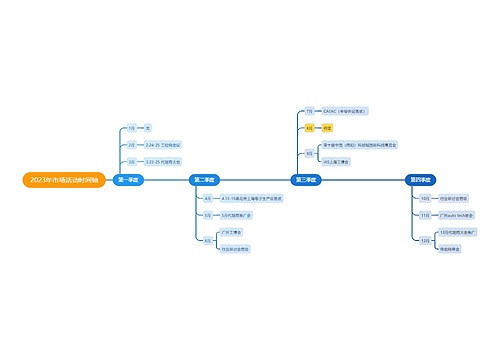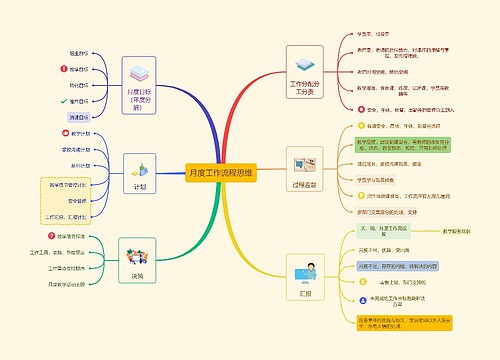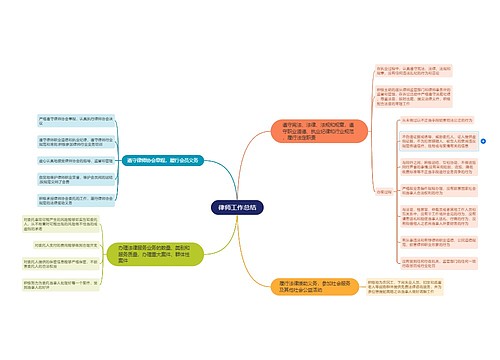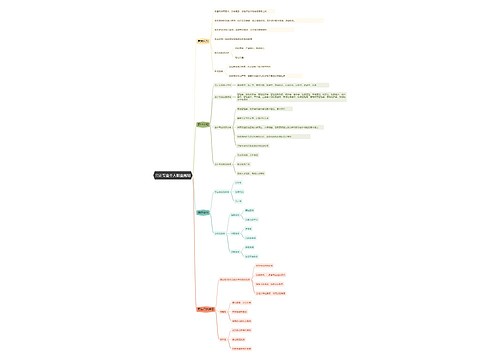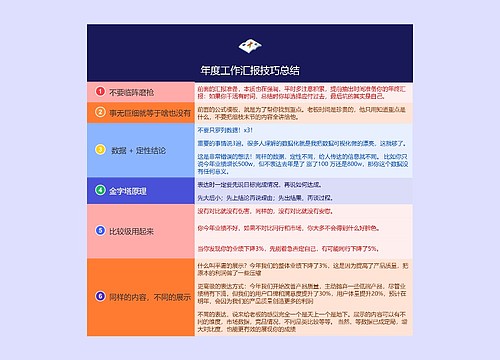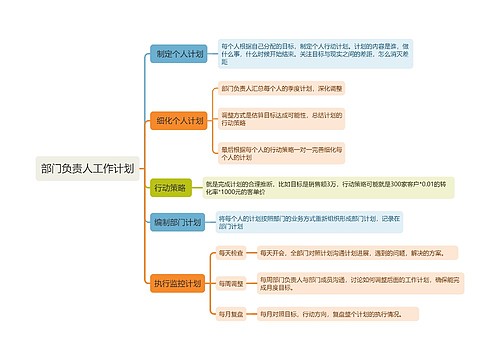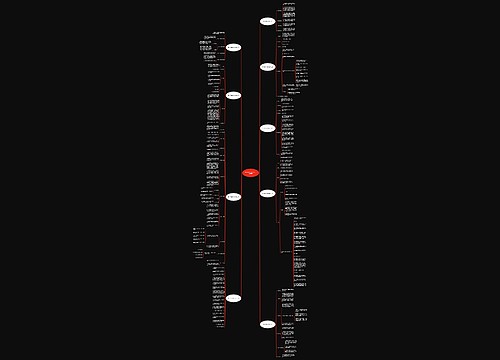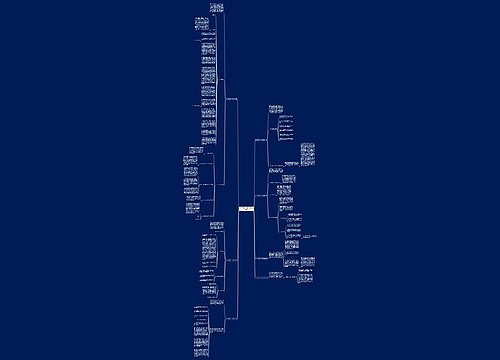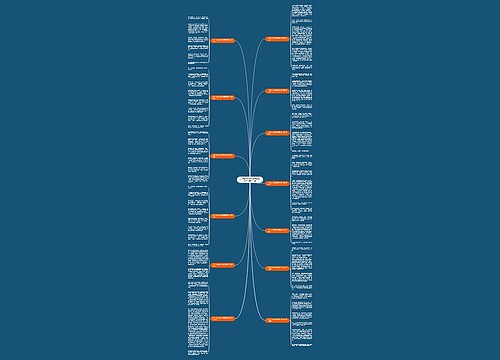
句子的英文复数【句子的英文单词复数】思维导图
清水入喉
2023-05-08

句子的英文复数【句子的英文单词复数】
按照句子的用途句子的英文复数,英语句子可分为陈述句、疑问句、祈使句和感叹句。按照句子的结构句子的英文复数,英语句子可分为简单句、并列句和复合句。
树图思维导图提供《句子的英文复数【句子的英文单词复数】》在线思维导图免费制作,点击“编辑”按钮,可对《句子的英文复数【句子的英文单词复数】》进行在线思维导图编辑,本思维导图属于思维导图模板主题,文件编号是:b31f4cc8ccac297b8f76e8713be625cc
思维导图大纲
相关思维导图模版
句子的英文复数【句子的英文单词复数】思维导图模板大纲
按照句子的用途句子的英文复数,英语句子可分为陈述句、疑问句、祈使句和感叹句。按照句子的结构句子的英文复数,英语句子可分为简单句、并列句和复合句。中考对句子的考查主要集中在以下几个方面:
1. 陈述句的构成形式及基本用法句子的英文复数;
2. 祈使句的构成形式及基本用法句子的英文复数;
3. 一般疑问句、特殊疑问句、选择疑问句、反意疑问句的构成形式及基本用法;
4. 由what, how引导的感叹句的构成形式、用法及区别
对于各种从句的用法我们在后面分别复习。
一. 陈述句的构成形式及基本用法
1. 陈述句:
陈述句是用来陈述一个事实或表达说话人看法(包括肯定和否定)的句子。通常用降调,句末用句号"."。
Tom has a new car.
The flower isn’t beautiful.
2. 陈述句否定式的构成
(1) 如果肯定陈述句的谓语部分含有助动词、情态动词或连系动词be,则只需在这些动词后加not即可构成否定式。
He is playing the guitar.(肯定)
He is not playing the guitar.(否定)
We can get there before dark.(肯定)
We can’t get thee before dark.(否定)
(2) 如果陈述句的谓语动词是实义动词,而其中又没有情态动词或助动词时,则需根据人称和时态在该实义动词前加don’t, doesn’t或didn’t。同时把该实义动词变为原形。
He plays the violin well.(肯定)
He doesn’t play the violin well.(否定)
She won the game.(肯定)
She didn’t win the game.(否定)
(3) 如果句子是there be结构或谓语动词是have(有),除了be和have之后加not之外,句中如果有some要变为any。例如:
There is some water in the cup. →There is not any water in the cup.
He has some books. →He has not any books.
(4) 除not以外,否定词no, never, nothing, nobody, few等也可构成否定句。例如:
There is something wrong with his bike. →There is nothing wrong with his bike.
I have seen the film. →I have never seen the film.
二. 祈使句的构成形式及基本用法
祈使句是用来表示命令、请求、建议、号召等的句子,谓语动词用原形,句末用感叹号"!"或句号"."。朗读时一般用降调。
1. 肯定的祈使句:
(1)祈使句主语是you时,you常省略,但如果要特别强调对方或表达某种强烈的情绪时可以有主语或称呼语。
Be quiet.
You be quiet!
(2)"Do+祈使句"表示一种强烈的感情或请求,do起强调作用。
Do come back at once!
Do be careful.
(3)please用在祈使句中可以表示一种客气的语气,但please用在句末时,必须用逗号与其余部分分开。
Open the window, please.
(4)Let引导祈使句时,后面需跟上人称代词或称呼语,人称代词一般只用第一、第三人称。
Let Jack wait a minute.
Let’s go to school.
(5)在祈使句中,Let’s和 Let us是有区别的。Let’s包括说话者,而Let us不包括听话者在内。这点从反意疑问句时可明显看出。
Let’s go skating, shall we?(表示内部的建议)
Let us try again, will you?(表示向别人发出请求)
2. 否定祈使句通常以Don’t或Never开头。其结构通常是:"Don’t(Never)+动词原形+其他成分" 例如:
Don’t do that again!
Never leave today’s work for tomorrow!
Don’t be late next time!
三. 一般疑问句、特殊疑问句、选择疑问句、反意疑问句的构成形式及基本用法
1. 一般疑问句:
(1)一般疑问句的肯定形式
一般疑问句一般是指以助动词、情态动词、be动词或have(有)开始,通常要求以yes,或no来回答的疑问句,一般疑问句读时通常用升调。
Do you know Mr. Smith?
Can you swim?
(2)一般疑问句的否定结构
① 在一般疑问句的否定结构中,把副词not放在一般疑问句的主语之后。但如果用not的简略形式-n’t,则须将-n’t与一般疑问句句首的be, have,助动词或情态动词写在一起。在实际运用中,一般都采用简略式。
Are you not a football fan?
Aren’t you a football fan?
Will she not like it?
Won’t she like it?
② 与汉语不同的是,英语一般疑问句否定结构的答语是否定还是肯定,全由答语的否定或肯定来决定。若答语是肯定的,则用yes加肯定结构;若答语是否定的,则用no加否定结构。
Aren’t you a football fan? 你不是足球迷吗句子的英文复数?
Yes, I am.
No, I am not.
Won’t she like it?
Yes, she will.
No, she won’t.
2. 特殊疑问句
特殊疑问句由"疑问代词或疑问副词+一般疑问句"构成,句子一般用倒装语序,但如果主语是疑问代词或由疑问代词修饰时,用陈述句的语序。特殊疑问句不能用yes或no回答,读时用降调。例如:
Who is on duty today?
How long have you been in Beijing?
What time do you get up every morning?
What must I do now?
常用的特殊疑问句
询问内容
疑问词或句型
例 句
回 答
职业,身份
what
What is your father?
He is a doctor.
姓名或关系
who
Who is that boy?
He is Jack.
He is my brother
相貌特征
what…like?
What is she like?
What does she look like?
She is beautiful.
目的
what…for?
What did they come here for?
To attend a meeting.
原因
why
Why did they come here?
Because they have a meeting to attend.
天气
how
what…like?
How is the weather today?
What is the weather like today?
It’s fine.
颜色
what color…?
What dolor is her skirt?
It’s red.
服装尺寸
what size
What size does he wear?
He wars 40.
几点钟
what time
What time is it?
It’s 7:30.
星期几
what day
What day is today?
It’s Tuesday.
几号,日期
what is the date…?
What is the date today?
It’s May 2.
年龄(多大)
how old
How old is he?
He is 38.
持续多长时间(多久)
how long
How long have you been here?
For five months.
长度(多长)
how long
How long is the bridge?
It’s 500 metres.
距离(多远)
how far
How far is it from here to the zoo?
It’s 6 kilometres.
频度
(多经常)
how often
How often do you come back?
Once a week.
时间经过
(多快)
how soon
How soon will she arrive?
In an week.
数量
(多少)
how many(可数名词)
how much(不可数名词)
How many jackets do you have?
How much coffee do you want?
Three.
Two cups.
价格
how much
How much is it?
How much does it cost?
Five dollars.
高度
(多高)
how tall(人,树)
how high(山,建筑物)
How tall is she?
How high is the tower?
She’s 1.73 metres.
It’s 450 metres.
3. 选择疑问句:
选择疑问句是说话者提出两种或两种以上的不同情况,让对方选择回答的疑问句。其结构是"疑问句+选择部分"。选择部分由or连接,or前面的部分读升调,or后面的部分读降调。
选择疑问句不能用yes或no回答,而必须具体的选择答复。
Is your bag yellow or black? It’s black.。
Would you like some tea or coffee? Either will do.。
Which do you like better, singing or dancing? I like dancing better.
4. 反意疑问句:
反意疑问句是指在陈述句之后附加一个意思与之相反的简短问句,问对方是否赞同的疑问句。附加问句的否定式必须缩写。
(1)肯定的陈述句后跟否定的附加问句,否定的陈述句后跟肯定的附加问句。
I am your teacher, aren’t I?
He didn’t study hard, did he?
(2)如果陈述句中含有否定副词never(从不,决不),hardly(几乎不)或其他表示否定代词或形容词,如nothing, none no one, nobody, neither, few, little等,则附加问句只能用肯定式。如:
They hardly write to each other, do they?
He has found nothing, has he?
Few people knew the secret, did they?
(3)当反意疑问句是"否定陈述句+肯定附加问句"时,英语与汉语的回答习惯存在差异。英语回答时只看实际情况,若答语的具体内容是肯定的就用"Yes+肯定结构",答语的具体内容是否定的就用"No+否定结构",而译成汉语时,则必须把yes译"不是",把no译成"是的"。
---You won’t be away for long, will you? 你不会离开太久,是吗?
---Yes, I will.不,我会离开很久。
---No, I won’t.是的,我不会离开很久。
---I don’t think she’ll come by bike, will she? 我认为她不会骑自行车,会吗?
---Yes, she will.不,她会骑自行车来。
---No, she won’t.是的,她不会骑自行车来。
四. 由what, how引导的感叹句的构成形式、用法及区别
感叹句是表示喜、怒、哀、乐以及惊异等感情的句子。句末用感叹号"!",读时用降调,感叹句往往由what或how引导,what修饰名词,how修饰形容词,副词或动词。
1. what引导的感叹句:
(1)what + a/an +形容词+单数可数名词+陈述句(主语+谓语)
What a beautiful city it is!
What an interesting story she told!
(2)what+形容词+复数可数名词/不可数名词+陈述句(主语+谓语)
What expensive watches they are!
What terrible weather it is!
2.How引导的感叹句:
(1)How+形容词/副词+陈述句(主语+谓语)
How cold it is!
How hard he works!
(2)How+陈述句(主语+谓语)
How he loves his son!
How I miss you!
(3)How+形容词+a/an+单数可数名词+陈述句(主语+谓语)
How tall a tree it is!
(4)上述两种感叹句可以互相转换。例如:
What a clever boy he is!→How clever the boy is!
What a cold day it is!→How cold it is!
【中考试题范例】
1. (上海徐汇区中考试题)
_________ useful computer it is!
A. What B. What a C. What an D. How
答案:B。该题考查的是感叹句的结构。这个感叹句的中心词是一单数可数名词computer, 所以要用what来修饰,又因为useful第一个发音是辅音,what之后的不定冠词用a,而不用an。
2. (嘉兴市中考试题)
---________ is it from Jiaxing to Hangzhou?
---I’m not sure, but it takes about ninety minutes to get there by bus.
A. How many B. How often C. How much D. How far
答案:D。该题考查的是特殊疑问句疑问词的选择。问话者是在问距离,所以应用how far来提问。
3. (河北省中考试题)
---_______ will it take us to get there by bus?
---About two hours.
A. How soon B. How often C. How long D. How quick
答案:C。该题考查的是特殊疑问句疑问词的选择。问话者是在问时间,所以应用how long来提问。
4. (长沙市中考试题)
---Help! There is a snake near the house.
---________ afraid. It will go away later.
A. Don’t B. Not C. Don’t be D. Be
答案:C。该题考查的是祈使句的结构。祈使句的否定结构是:"Don’t(Never)+动词原形+其他成分" 符合这一要求的只有C。
内容规划:待满足"圈子功能与专栏功能"时,图说英语原创图文与短视频陆续对外开放。每一步前进,都离不开大家的转发与支持,欢迎大家,一起解锁更多精彩英语学习内容!
智学英文:短视频+图说英语
习得路径:拼读+跟读+阅读
图说新概念+七日练音标/拼读/单词/语法
始终坚信:好的分享是一种"美"!发现美,创作美,分享美!
查看更多
904名中国成年人第三磨牙相关知识、态度、行为和病史的横断面调查思维导图
 U633687664
U633687664树图思维导图提供《904名中国成年人第三磨牙相关知识、态度、行为和病史的横断面调查》在线思维导图免费制作,点击“编辑”按钮,可对《904名中国成年人第三磨牙相关知识、态度、行为和病史的横断面调查》进行在线思维导图编辑,本思维导图属于思维导图模板主题,文件编号是:10b9a8a2dd2fb4593f8130ef16c320fc

9.战斗的基督教思维导图
 U582679646
U582679646树图思维导图提供《9.战斗的基督教》在线思维导图免费制作,点击“编辑”按钮,可对《9.战斗的基督教》进行在线思维导图编辑,本思维导图属于思维导图模板主题,文件编号是:33d168acd0cd9f767f809c7a5df86e3a
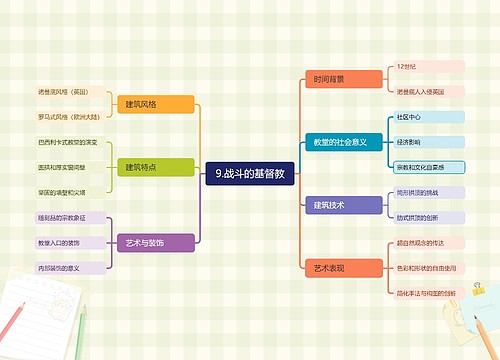
相似思维导图模版
首页
我的文件
我的团队
个人中心
